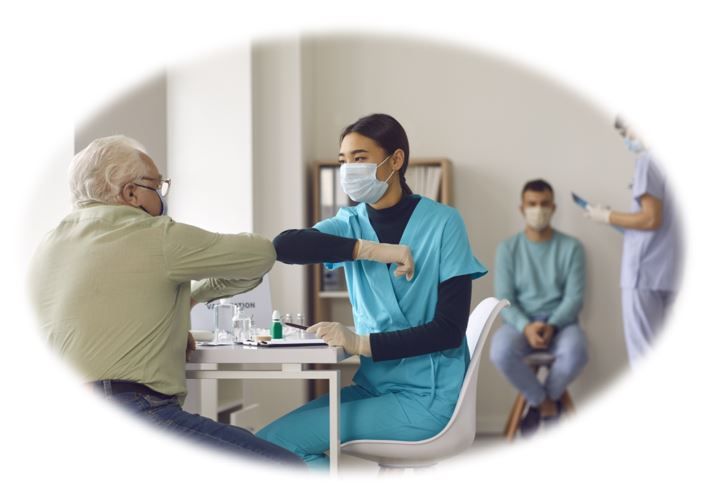- Clinical Technology
- Adult Immunization
- Hepatology
- Pediatric Immunization
- Screening
- Psychiatry
- Allergy
- Women's Health
- Cardiology
- Pediatrics
- Dermatology
- Endocrinology
- Pain Management
- Gastroenterology
- Infectious Disease
- Obesity Medicine
- Rheumatology
- Nephrology
- Neurology
- Pulmonology
Vaccine Clinic: If Abuelo Could See Me Now
As a second-year medical student volunteers at a COVID-19 vaccine clinic, the Spanish last name shared by the elderly couple now in front of her is a poignant reminder of why she chose medicine.
Abuelo and I would always joke that he would never see another public health crisis like the COVID-19 pandemic in his lifetime. My grandfather was 83, after all, and a retired physician who enjoyed reading the news and staying connected to medicine.

As his sole grandchild pursuing a medical career, I know that we shared a special bond. Abuelo was my role model and once I started medical school, I used our weekly phone calls to convey to him how excited I was to be following in his footsteps. Frequent visits home were well spent with trips to Abeulo’s house and more medical chats.
But, early in my unorthodox second year of medical school amid the COVID-19 pandemic, Abuelo suddenly passed away, taking with him a part of my medical journey.
Now I am eagerly approaching the end of my didactic learning at the Medical College of Georgia, in Augusta. Augusta University Health, the primary teaching affiliate for the Medical College of Georgia, continues to lead local vaccine efforts in the Central Savannah River Area. Students from the Medical College of Georgia and the College of Nursing at Augusta University are encouraged to participate in the effort in both non-clinical and clinical roles including by observing patients, loading syringes, and administering vaccines.
After months of being confined to primarily virtual, lecture-based learning, many of us eagerly jumped at the opportunity to assist on the frontlines.
The COVID-19 vaccine had been accessible to our community members aged ≥75 years for about a week when I first made time to volunteer at a vaccine clinic. Sitting in the 15-minute post-vaccine waiting area as an observer, I couldn't help but notice the elderly patients. Several were accompanied by spouses, children, or grandchildren. The scene reminded me of the close relationships Abuelo had with his family in his last years of life.
I wondered what he would have thought about the national vaccine distribution. I imagined him sitting next to me in the vaccine clinic and saying, “Amanda Marie, I am so proud.”
After a shift as a non-clinical volunteer, I felt it was time to learn how to administer the vaccine. The old teaching method “see one, do one, teach one” held true in the vaccine clinics, and after a couple of practice “jabs,” I was administering vaccines up to 8 hours-a-week while also showing many of my colleagues how they could help. I vaccinated people from all walks of life—different ages, occupations, ethnicities—but one couple stood out for me.
I greeted the older couple, linked arm-in-arm, as they took a seat at my station. Taking their vaccination cards, I asked them to confirm their names and dates of birth. I recognized the last name as Spanish and heard them anxiously whispering to each other as I completed their paperwork. Rarely do I do this, but I took a chance and asked where they were from.
“Havana, Cuba,” they kindly replied.
I thought immediately about my grandparents. Abuelo graduated from the University of Havana Medical School, and he brought his family, including my father, to the United States from Cuba in the early 1970s.
I shared this with the couple as I rolled up their sleeves to give them their first doses of the new COVID-19 vaccine. They smiled and told me they had also immigrated from Cuba in the ‘70s. Acknowledging our shared history in both Spanish and English, they said that my family must be so proud of me.
I had to fight back tears as I prepped them for the vaccine. I imagined what it would have meant to Abuelo to have been here and to have received the vaccine from me, too.
I often am still shaken thinking about the connection I shared with the couple from Cuba. While Abuelo is no longer with me, his legacy resonates deeply and will shape the physician I become. And he was right—he will never see another global pandemic. But I know that I will hold tightly to my memory of him and be better prepared should another one occur in my own lifetime.
